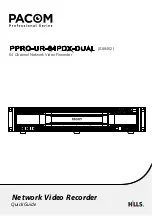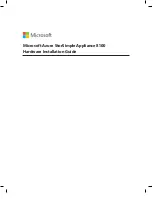
Managed Switch CLI Manual, Release 8.0.3
Routing Commands
4-65
v1.0, July 2010
show ip ospf
This command displays information relevant to the OSPF router.
Format
no trapflags {
all |
errors {all | authentication-failure | bad-packet | config-error |
virt-
authentication-failure | virt-bad-packet | virt-config-error} |
if-rx {all | if-rx-packet} |
lsa {all | lsa-maxage | lsa-originate} |
overflow {all | lsdb-overflow | lsdb-approaching-overflow} |
retransmit {all | packets | virt-packets} |
rtb {all, rtb-entry-info} |
state-change {all | if-state-change | neighbor-state-change | virtif-
state-
change | virtneighbor-state-change}
}
Mode
Router OSPF Config
Format
show ip ospf
Mode
Privileged EXEC
Note:
Some of the information below displays only if you enable OSPF and configure
certain features.
Term
Definition
Router ID
A 32-bit integer in dotted decimal format identifying the router, about which information is
displayed. This is a configured value.
OSPF Admin
Mode
Shows whether the administrative mode of OSPF in the router is enabled or disabled.
This is a configured value.
ASBR Mode
Indicates whether the ASBR mode is enabled or disabled. Enable implies that the router is
an autonomous system border router. Router automatically becomes an ASBR when it is
configured to redistribute routes learnt from other protocol. The possible values for the
ASBR status is enabled (if the router is configured to re-distribute routes learned by other
protocols) or disabled (if the router is not configured for the same).
RFC 1583
Compatibility
Indicates whether 1583 compatibility is enabled or disabled. This is a configured value.
















































